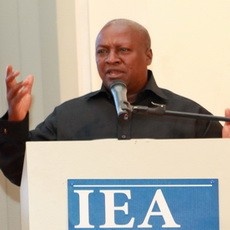- Home - News
- TWI News | TV
- Polls
- Year In Review
- News Archive
- Crime & Punishment
- Politics
- Regional
- Editorial
- Health
- Ghanaians Abroad
- Tabloid
- Africa
- Religion
- Election 2020
- Coronavirus
- News Videos | TV
- Photo Archives
- News Headlines
- Press Release
General News of Friday, 19 October 2012
Source: The Ghanaian Times
I'll be Prez for all- Mahama promises nation

President John Mahama yesterday assured Ghanaians that he would be President for all if the electorate retain him in power, in the upcoming elections.
“I will be the President of all and hold high the flag of Ghana,” he assured, when he took his turn at the Institute of Economic Affairs' (IEA) Encounter with Presidential Candidate in Accra, last night.
The President who is the first siting president to participate in the encounter, outlined a number of key policy issues that an NDC government would implement when voted into power.
Key among them, he said, would be the government's active participation in private sector-led economic growth and employment creator interventions.
He said a sound infrastructure base was crucial to the attainment of the country's goal to building a thriving private sector and resilient economy for more jobs.
Below is the part of the text read by the President.
A critical part of expanding our economy is the expansion of infrastructure development. A sound infrastructure base is crucial to the attainment of our goal to building a thriving private sector and a resilient economy for more jobs. Key amongst these is ready access to regular supply of power.
This is why we promise to launch an “Energy to Every Home' programme under which universal access to electricity and energy will be targeted by 2016.
In between now and 2016, we have two critical milestones: As has been announced by the Volta River Authority, in December, we will end the current load management exercise that was put in place as a result of interruption in gas supply from the West Africa Gas Pipeline Project by end of next month.
By the end of 2013, Ghana's deficit in Energy supply will be significantly minimized, thereby largely eliminate the need for load management.
These will be achieved by increasing power generation from 2,443 megawatts to 5,000 megawatts by 2016 through an active partnership with the private sector and improvement in transmission equipment.
By 2020, to meet the demand of the iron industry and other large consumers by increasing to 15,000 megawatts.
In addition, our focus on people-centered infrastructure will involve: Increase social housing and improve sanitation and social facilities that promote secured settlements for the people's improved welfare; Continue the Western and Eastern Corridor Roads and modernize the Central spine.
Construct a new deep sea port in the Western Region: Target the development of the country's potential mini-hydro projects with capacities below 100 megawatts, especially in the northern savannah zone, in partnership with SADA;
Development and upgrade the port at Buipe to serve as an inland port for the five SADA regions; commence the process for a new international airport for the nation's capital; Upgrade the Tamale Airport into Ghana's second international airport, Takoradi, Kumasi and Sunyani domestic airports to handle increasing commercial activities and passenger loads.
Accelerate the street naming and house numbering scheme.
We are convinced of the transformatory role of agriculture in our economy. We will implement the Medium-Term Agriculture Sector and also improve productivity to world standards.
Ladies and gentlemen, the long-cherished vision of our citizens for Ghana's very own national carrier will be realized under our next term. We will, in partnership with the private sector, bring back a proud and prosperous airline for Ghana.
I am convinced and determined, that together, we can reach new heights of growth and development.
Fellow Ghanaians, all these initiatives on the economy and infrastructure are foundations for the creation of Sustainable jobs.
The issue of jobs has become a global challenge, and everywhere in the world. It is a significant challenge facing all nations, from the United States to France to South Africa.
The attention of governments has been squarely focused on how to expand their job markets to put people who have been laid off back to work, and on how to absorb new entrants into the job market. Ghana is no exception.










